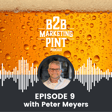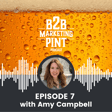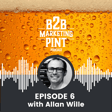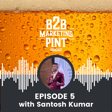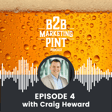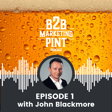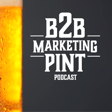Become a Creator today!Start creating today - Share your story with the world!
Start for free
00:00:00
00:00:01

🎧Earned Media or Bust: Why PR Beats Paid in the Long Term
Brian and Brendan crack a cold one with PR powerhouse Cathy Summers, who brings 20+ years of Silicon Valley media savvy to the table.
They dig into why earned media still matters in a world dominated by Google, LinkedIn, and AI-powered ad platforms. From building credibility to lasting search visibility, Cathy explains how PR can out-punch paid when it's done right—and when it really isn't worth a press release.
You’ll learn:
- Why the best PR starts with story, not spin
- How AI and SEO now depend on earned content
- When a press release doesn't make sense
- Why the trades still matter—and how to use them strategically
- The myth that “any press is good press” (spoiler: it’s not)
Whether you're planning your next campaign or trying to stay out of PR trouble, this episode has the insights B2B marketers need to scale smart.
Transcript
Introduction to 'B2B Marketing Pint' Podcast
00:00:00
Speaker
Your B2B Marketing Pint is the podcast for B2B technology marketers who want to sharpen their competitive edge. Joined by other marketing veterans, your hosts Brian O'Grady and Brendan Ziolo share expertise on what works today and why.
00:00:16
Speaker
Grab a cold pint of hot takes on branding, content marketing, demand generation and more served with a side of sarcasm. Hi everyone, welcome to the latest edition ah episode of the B2B Marketing Pint.
Introducing Guest: Cathy Summers
00:00:33
Speaker
I'm super excited today to be joined by Cathy Summers, who is a PR veteran from Silicon Valley. ah She's been working with both large and small companies for a number of years, getting them great coverage in top tier media, industry publications, and really working with them on their messaging and an overall approach to PR and communications.
00:00:54
Speaker
ah She was with an agency called s Shift Communications, but she now runs her own boutique PR agency and works with a number of clients in the Bay Area and otherwise.
00:01:05
Speaker
So super happy to have Kathy with us today.
Casual Chat: Drinks and Atmosphere
00:01:08
Speaker
And to get us rolling, Kathy, what are you drinking? Today, i am drinking Cascade Lakes Salted Caramel Porter.
00:01:17
Speaker
So highly recommend if you're ever in Bend, Oregon. right. Well, sounds like a challenge, Brian. Should we book our flights or? I can't think of a better reason. And I do remember I've i've worked with Kathy ah for a number of years and I do remember her being very particular about the beer. So I'm not surprised. It's a very local craft oriented one.
00:01:41
Speaker
I'm drinking. I think I might be repeating beer. Is that is that wrong? I'm drinking an Athletic Brewing Company IPA, ah once again, non-alcohol variety.
00:01:52
Speaker
ah This was one of the first I had that was very, very good. So continue to enjoy that. And Brian, what are you drinking? Well, thanks for asking. I think I'm going to go to the opposite end of the spectrum from your fancy craft-flavored, unique, fancy beers.
00:02:12
Speaker
and i'm going to you're gonna younna fall off your chair when I introduce you to this one. This one's called Pabst Blue Ribbon. Oh. And you might think to yourself, Brian, what has happened? How did this happen to you?
00:02:28
Speaker
And yeah there are reasons. you that you dbr Yes, it's a PBR. There are a couple of good reasons this has happened to me. First of all, believe it or not, it's made down the road for me in Guelph by Slemans here in Canada. They actually make it. So my neighbors make it, which is hilarious.
00:02:43
Speaker
ah But most importantly, it features in a David Lynch film, ah Blue Velvet. And because of that, we occasionally have a throwback and there's certain recipes around here that require perhaps blue ribbon. So I thought today was the day to shake it up and, ah and go retro and go to the opposite end from the micro breweries to PBR.
00:03:06
Speaker
And with that, well, anyone that ah shall we she shall
00:03:17
Speaker
Kathy, I can't think of anything that's much more opposite. to your beverage than a PBR.
How Has PR Evolved with AI?
00:03:24
Speaker
Yeah. Nope. We got to wait. Brian's still pouring. Brian. Oh, sorry. For the glass. No, I'm pouring. Cheers. No, I'm a can. Drink it from a can. Cheers. All right.
00:03:36
Speaker
And I think we've we've really, we've really opened the, ah the potential breweries to sponsor this today, Brian. So kudos on that. And Kathy, we've got it all covered. This could be a whole new demographic with PBRs on the show.
00:03:49
Speaker
Let's find out.
00:03:52
Speaker
You guys want to talk about some PR and some marketing now? Sure. All right, let's do it. full Full disclosure, full transparency, Kathy. Once upon a time, iowa was a PR guy myself. I don't claim to still be one or even really know the score or the industry there anymore, but I am eager to pick your brain on the topic to see what's changed.
00:04:14
Speaker
Okay. So off the top, that's where I want i want to go first is I don't think PR is the same anymore as when I was a PR guy back in the day. How has being a PR practitioner changed in the last
AI's Dual Role in PR Strategy
00:04:29
Speaker
few years? And in particular, what is AI doing to your daily life as a PR practitioner?
00:04:35
Speaker
Oh, okay.
00:04:38
Speaker
Let's start with what's changed. So I think that some really big shifts have happened. The media landscape is smaller. Newsrooms are smaller.
00:04:50
Speaker
Reporters are stretched very thin. And that is especially apparent in the trade publications where before you might have had a reporter covering storage and somebody else covering data and somebody else covering security. And now there might be one reporter that has to cover all of that.
00:05:10
Speaker
So they are stretched more thin. ah Used to be that they would do maybe couple of stories a week. And now I'm seeing more and more where it's a couple of stories a day that they're responsible for putting out.
00:05:25
Speaker
So higher volume, ah rush to be first. but And because of the smaller newsrooms and fewer opportunities yeah're we're seeing a lot of journalists start to basically try to make a name for themselves via sub stacks, newsletters, different types of media outlets, podcasts.
00:05:49
Speaker
So it's becoming more fractured as well. Like there's not just the traditional print or online websites that you go to. And there's only so many of them. Like it's just a much more fractured landscape.
00:06:05
Speaker
And everybody's doing a lot every day. And they all have the analytics now to see how stories are performing. Whereas before, you know, you never knew who was reading or if they were engaged.
00:06:20
Speaker
Now, you know, with Google Analytics, you can see what stories people click on, how much time they're spending there. And so if, you know, you're going to see more, you know, those salacious, if it bleeds leads type of headlines to try to get you to click through.
00:06:36
Speaker
So
Earned Media vs. Paid Media
00:06:37
Speaker
often, you're going to see some of the big names, right? They want to have Apple or um Google or Salesforce in their headlines so that you get more interest, right? So the smaller guys are not going to be big click drivers. So you have to find ways around these to make a The reporters want to write about you, right?
00:07:03
Speaker
um What else has changed? AI has definitely changed um a lot of things for us.
00:07:10
Speaker
On the content side, clients really want to lean into ai content. and publications really, really do not want ai content.
00:07:25
Speaker
So i find that a lot of my day is trying to suss out whether I've been given content and then trying to make that human content to get it to reporters. So it's a lot of trying to educate clients on where and when we can use AI. and trying to reduce, I think the term that has popped up in the last week, I think it was the Harvard Business Review, they call it work slop, which is what I sometimes get some work slop, and trying to make that human and less slop.
00:08:06
Speaker
So you're almost playing the role of like the the high school teachers or the university profs who have to run everything through an AI checker now to see if you're, if somebody is just giving you AI generated noise instead of an actual story. I'm just trying to make it.
00:08:19
Speaker
Yeah. Like I understand that they're putting it into a, you know, they're putting a prompt in that has some of their ideas. And I'm like, I would rather it sound much more authentically you than so polished through AI. So yeah,
00:08:34
Speaker
How would, you know, let's talk about how to make this really sound more like you would you would say it, not the way that, you know, AI would say it. Fair enough.
00:08:47
Speaker
So as you mapped out the media landscape there, Kathy, I've seen it myself too, you know, it's getting earned media is challenging now. it it It always has been at some level, but it seems more challenging now. Yet most organizations I talk to or work with, they tend to go more the paid media route. That's kind of their go-to route.
00:09:08
Speaker
more than earned media. Why do you think earned media is still important? Like why still do it if I can just throw buckets of money at Google, LinkedIn, Meta or whomever and get the ads
The Role of Press Releases in Modern PR
00:09:20
Speaker
out?
00:09:20
Speaker
All right. Let's talk about that because You're right that organizations are gonna default to paid because it feels like a really fast way to get some results.
00:09:32
Speaker
But earned media is still really important. And I think that one of the biggest reasons is credibility, right? Everyone knows when they see an ad that it's bought and paid for, and they're telling you what you know but the company wants you to hear.
00:09:49
Speaker
But when a journalist, an analyst, a an influencer, when they're writing about you, it carries that third party validation that there's no paid version that can match it, right?
00:10:05
Speaker
It just, you know that somebody else is giving it some type of implicit validation just by writing about it. um And they're more likely to and to not be over the top and really be more measured in what they're saying about your company.
00:10:21
Speaker
um I think another reason is the longevity of a story. So paid media, once your budget is out, a paid is done and those ads go away. But an article, a podcast, an analyst mentioned in a report can live online for years, for an extended period of time. It keeps getting shared, discovered,
00:10:44
Speaker
And now, and I should have mentioned that this is another way that AI is really changing the game for PR, is that and with generative ai you're seeing that these AI tools, these ah chat GPT and the like, are drawing on credible published sources to generate their answers.
00:11:06
Speaker
So, they're looking when somebody types in a question, they're looking to that earned media for putting together their their response.
00:11:18
Speaker
So it's it's a different, it's AI SEO, right? So that quality earned coverage is going to not only reach the people who read that article in the moment, but it's going to live online, it's going to be discoverable, AI is going to generate responses around it.
00:11:38
Speaker
So i I think that's still a really important outlet. And i don't know that companies understand how AI is ah finding their answers.
00:11:52
Speaker
And I don't think that they're understanding that B2B buyers are looking there, right? They're Googling stuff, they're doing research. And those AI overviews or those AI tools are going to help them like navigate that process and earned media can be very impactful there.
00:12:12
Speaker
Yeah, totally. yeah I love the credibility yeah credibility part there. And it it definitely even helps your work slop starting point from the previous question stand out. But yeah, I read an article similar to what you were saying as well around the the AI engines really looking at these third party credible sites ah to help fuel their answers. So, you know, obviously getting getting mentions there, getting coverage there will will go a long way.
00:12:40
Speaker
couldn't Couldn't agree more. and We see that in what we do all the time. If you want to, if you want to, the Google fight now is involves AI ah thoroughly and every day, not not a little bit and occasionally.
00:12:51
Speaker
and the And the gap we're seeing in our industries, between industries that are AI savvy and those that aren't is quite remarkable. But that's a whole other ah whole other podcast.
00:13:01
Speaker
We're going to keep this one on on PR. And I might be revealing a little bit of my age or my dated approach to PR at this stage with this next question. but i'm going to throw it out there anyway.
00:13:12
Speaker
And I'm going to weave in a really self-serving plug at the same time. So now you've been warned full full transparency. So back in the day, and maybe in... for For many, many decades before even I did it, the media release may or may not, you'll tell us, have been the pinnacle of PR practice.
00:13:32
Speaker
The media release. I considered it when I was doing it was kind of the bread and butter of a PR pro. So if we had an announcement, like, for example, let's say your agency had been shortlisted for a number of global search awards, and For a couple of client projects with folks like Tourism Kingston or Rewind Software. That's just hypothetical, Kathy. That's just hypothetical. Let's say you wanted to share that news. I need to find the sensor button.
00:14:00
Speaker
I need to find that. Where can we sensor that? Shameless plug label. we We need the sound effects. Just kidding. Just kidding, Brian. It's flashing at the bottom of the screen, right? Shameless plug. Yeah. Working it in the working it into the feed right now, Kathy.
00:14:15
Speaker
They used to have a blinking text HTML code back in the day, which was truly obnoxious. It was probably the most obnoxious thing. So, okay. So back to the matter at hand. Plug done.
00:14:27
Speaker
Let's say you had an announcement like that. Does the media release still matter? Is it the be all and the end all of PR? And if not, what is?
00:14:39
Speaker
So I feel like I spend more of my time and telling some clients that's not a press release. That's not a press release. That is not worth a press release.
00:14:53
Speaker
You're just going to say it's not newsworthy. It's not. it So I love a press release. I love to write press releases. I got into this career not because I hated them, but they are one tool.
00:15:06
Speaker
And I think too many companies think, you know, it's that old, it's a hammer. And all they have is that hammer. Everything in the company is a nail. And it's like, no, no.
00:15:19
Speaker
No, no, no. And we have to look at other things. So there are times where maybe a blog is a better way to get that out, right? Particularly when you're talking about putting a press release over the wire and wire services can be very expensive.
00:15:37
Speaker
You know, some clients spend like $2,000 on every press release that goes over the wire. And it's like, this isn't worth that. that you know either the audience for this is so small or the people would care about this or No journalist is going to cover that. Like this it isn't a big enough story, um but you want to get it out there. There's ways to do that. that It's great to put that on social. It's great to put that out on a blog. It may not be a press release, but I will never say the press release is dead.
00:16:08
Speaker
Nobody should ever do it. Like that's not true. But I just think it has to be something that is that that somebody who doesn't work at your company will care about.
00:16:20
Speaker
I'm shocked. yeah no That's completely fair. And I think at at the risk of oversimplifying your argument, if it's not actually newsworthy, it probably doesn't deserve ah press release.
00:16:33
Speaker
yeah Yes. Fair enough. I can't deny that. There are times
What Makes a Story Media-Worthy?
00:16:38
Speaker
I've run into a CEO, you know, the CEO just wants it. He just wants it and it's going to make him feel good.
00:16:45
Speaker
And if he's willing to write that check, and then it's no harm, no foul. Like, I'll just, you know, just do it Make the CEO happy. Sometimes that's part of this job is making the CEO happy.
00:16:58
Speaker
You know, you give your best advice of like, hey, I think this would be better as a blog and some posts on LinkedIn and get people in your company to share this. and get traction that way. And if they're like, nope, the CEO really wants to put this out. He's really pumped about it. He told his mom, like, we've just got to get this, then just do it.
00:17:20
Speaker
Fair enough. no matter No matter what, don't upset the CEO's mom. That's the other takeaway here. If she's expecting that this is this is going to be out there papering the internet, then great, we'll do that.
00:17:35
Speaker
So maybe another... hypothetical man i think we're throwing a lot of these at you today kathy sorry about that but uh i remember this i mean i worked at a startup when we worked together and hopefully we didn't ask you this but we probably did knowing knowing us you know so smaller unknown startup you know early stage not you know not high profile basically comes to you and says you know I need to be in the Wall Street Journal or New York Times or pick other top tier publication named here.
00:18:09
Speaker
i mean, what do you what do you say to them when they come with that expectation? Well, it's funny. Often when I hear that, they claim they have a really great story.
00:18:20
Speaker
Right. And a really great story is absolutely critical. But A really great story for who? And I think that that is often overlooked. Like it can feel like a really great story from the founder's perspective, right? Let's go back to the CEO that's pumped about being on a short list of so an award and he wants to get that out there, right?
00:18:46
Speaker
Yeah. Okay. that That is a great story from that, right? The CEO has accomplished something and this is important. However, does that resonate with publication audience? was team effort, Kathy. was really a team effort, you Team effort.
00:19:03
Speaker
But sometimes it can be our, you know, our really great story is, you know, we closed X customer. Oh, and we can't name them. That's that's tough. Yeah.
00:19:16
Speaker
Yeah. So, you know, i understand that you went through all these, but like they want to talk about the sales. but You know, we did this and we beat this guy out. Now, will the customer say no, they won't say any of that. But we've got this great story we can tell.
00:19:30
Speaker
one. you know one That is going to be extremely difficult to just like trust you that that's what happened and how it went. And those top tier outlets, they're looking for stories that resonate with their audience.
00:19:48
Speaker
And the New York Times, the Wall Street Journal, they're looking for stories that have really broad implications, right? They affect a a large swath of their readership, which are just you know people from all walks of life.
00:20:04
Speaker
And it needs to fit into trends that their readers care about. So what are the hot topics of the day? like Does this fit into that? like Whatever the trending topic. It's not just being new. It's not just being exciting.
00:20:18
Speaker
You have to have relevance. And it has to have some kind of impact. One person that i I was chatting with, who's also in the PR industry said, you know, people reading the wall, they had a interview with a Wall Street Journal reporter. And during the interview, the Wall Street Journal reporter said, people reading the journal right now only care about how to get their kids off the couch, how to make themselves and their families money.
00:20:48
Speaker
If the story can't do that, Wall Street Journal doesn't have an angle. So, you know, your new gee whiz technology, if it's not getting the kids off the couch, if it's not going to help them make money, like, I don't know how much the journal is going to care, according this one reporter, right? It's one guy's opinion.
00:21:04
Speaker
Sounds like a paper route could solve both problems if people still delivered papers. There you go. If only people read the paper anymore. Yeah. But, you know, I think that that that needing that broader impact, needing that relevance, that is what is really important. So when we're talking about those outlets, like we dig into that story and we talk about the types of stories that the Wall Street Journal will cover and.
00:21:33
Speaker
You know, it's it's going to be things like, hey, do we have a strong founder profile? Somebody who's maybe a serial entrepreneur, had it some big exit, um somebody who used to be at one of the big tech companies that has now left and starting their own company. Like, is there a profile here we can dig into?
00:21:52
Speaker
Did you have a a bigger than average round of funding, right? Not just kind of what the norm is for that round. but you know, an outsized round, or did you manage to attract some marquee investors?
00:22:07
Speaker
Like, is there something about the story that is going to make it more broadly interesting? and And if we're going to talk about market traction, which is a great, you know, credibility point to get in with a journalist, like, can we talk about customer growth? do you have any early validation metrics, um,
00:22:28
Speaker
Are there some new product or partnerships that we can talk about? Like you just need to have a lot of elements and you also then have to find the right person at the publication.
00:22:42
Speaker
And oftentimes if you talk to some of these reporters that cover certain beat, like they're the cybersecurity reporter at the New York times, they are reading the trades for who's making noise in the trades.
00:22:56
Speaker
If you are not in the trades at all and you don't bubble up onto their radar, they're going to think like, who is this company? Like, why should I pay attention? So those reporters that have a beat absolutely know what's happening in their in their little industry that they're covering. And the majority of that information is coming from the trades.
00:23:18
Speaker
So we'll talk about building that. Like, you've got to start somewhere. You've got to start in those trades. You've got to work your way up. um and then get the attention of the right person at the right publication at the right time.
00:23:32
Speaker
So the trades are the miners working your way up to the majors. you If you can't break in there, then you're not you know you're not going to break in bigger. it's It's rare that that happens. And there's always some caveat to that, right? Like I said, it'll go back to a strong founder story.
00:23:51
Speaker
um It'll be something that is that makes you stand out and very different from the pack if you suddenly come out in a big splash in the New York Times. And I think the trades are also important, I've always thought, because quite often the audience that you really need to reach is reading those, right? That's where your buyers are. Not the New York Times. I mean, they might read those too, but you know when they're in that I need help solving problem X, or I'm looking for solution Y. They're looking to the trades. They're not looking to the Wall Street Journal to recommend, you know, the next security solution or cloud provider or whatever. So
Handling Unreasonable PR Expectations
00:24:28
Speaker
correct yeah, I definitely, I think the trades is a great starting point. And that's good advice, cassie Kathy, for our our listeners.
00:24:36
Speaker
One of, I think the themes that's emerging here, which has not changed, is that a PR pro's job might include as much killing of stories, killing of bad stories that don't matter, as it does promoting actual stories.
00:24:51
Speaker
And so I've got an example that I want to know if this still occurs in the industry to you or not. Because I've been part of, when I was a PR guy, I was a part of a big organization, a very large multinational. And people at that multinational learned that one of the quickest ways to tell your boss's boss's boss that you'd done something cool was to actually try and get news coverage of it. Instead of, say, wandering down the office or picking up the phone or sending that person an email, it was to go to the PR person's office and try and get them to make news about it.
00:25:26
Speaker
so that your boss's boss's boss heard about it that way. Does that still happen in big organizations? And if it does, how do you stop it?
00:25:37
Speaker
So it just happened yesterday and it doesn't have to even be a big organization. it can be a medium. so it It just... I, again, I feel like there are some organizations where something good happened and the best thing is let's go put out a press release.
00:25:58
Speaker
Like that is just the default response. And so without naming names, yesterday had a client say, Hey, um our Japan office wants to put out this press release for this big conference that's happening in the middle of October.
00:26:16
Speaker
And we are a partner with that company that's having that big conference in the middle of October. And we are gonna be leading a session there. We have a session at this show.
00:26:29
Speaker
from the From the Japan office, the session will be in Japanese for for Japanese people. And so we wanna put out a press release in English.
00:26:41
Speaker
tell yeah I digress here. yeah That one didn't survive. There were, there were so many, no, no.
00:26:53
Speaker
now All of this is a no.
00:26:56
Speaker
So we had to explain like one, there's a deadline for getting press releases for this conference, which has passed by almost two weeks. And there's,
00:27:09
Speaker
There are many sessions that we are participating in. This is just one. and while it's very cool that it will be in Japanese, that does not bubble up to a whole press release. So yes, yes, it still happens. And you have to learn in this job how to say no.
00:27:30
Speaker
and talk about other things they can do, right? it can' You can't just be no, period. Like as much as I would love to just be the department of no and just say no, period, and move on. And legal might sue you for for taking their jobs. If you took the department of no away from legal, they might come after you. Yes, yes.
00:27:48
Speaker
So you have to be no, but we can, you know, it has to, it's like media training. um You have to segue into what you can do,
00:27:59
Speaker
And what other things might help get that word out. Like you might send a message to all of your Japanese prospects and, you know, folks who you know speak Japanese and tell them about this event.
00:28:18
Speaker
like So you want to talk to the people that might actually care. Attend. Yes. Go directly to them. That's just one example. That was yesterday's example.
Creating Credible and Engaging Stories
00:28:31
Speaker
Okay, maybe things haven't changed as much as I thought. No, no. So other than ah potentially giving legal a run for their money on the Department of No, I think the other common theme so far, Cathy has really been around, you know, it really comes down to having a good story.
00:28:51
Speaker
mean, that's the other part of what we've talked a lot about today. And I'm sure some of our audience already knows that. But can you give us some of your, you know, tips, some of your, you know, from your experiences, what makes a good story? And then, you know, how do you get the media or analysts to care about that? Or when you have a good story, they automatically care, like,
00:29:12
Speaker
but As we kind of wrap this up, what are some tips we can leave our audience with around story? Okay, let's let's talk about a good story. I think that the most important thing about a good story that the media really latches onto is that it's timely and relevant.
00:29:30
Speaker
So I have a client that really kind of plays into the tariff conversation and what companies... can do about it or how they're managing the unpredictability and volatility around tariffs. You know, one day it's this and then it's that. And and that is a big talking point for them for their solution.
00:29:52
Speaker
And so being able to talk about how tariffs will impact this business or this industry, but what is it going to mean for back to school shopping? What is it going to mean for holiday shopping? What is it going to mean, you know, for different industries at different times?
00:30:09
Speaker
and We've been able to capitalize on that, not because the client is such a big company with a big name and has you know all these resources. It's more that we're very timely, we have the right insights, and we can deliver on that.
00:30:23
Speaker
So i really will never discount how important it is to be timely and relevant, right? um I think that the other thing that matters is data and insights.
00:30:38
Speaker
If you have original research, metrics, analysis that can give stories some credibility, that has worked well. So for another client, they did a survey back in the spring.
00:30:51
Speaker
And we we took that survey and looked at all of the data in there. And we parsed it into three different reports. Each report was announced, like we had one in June, one in July, and one in September, which was kind of a bigger wrap up of a lot of the themes of the entire report, which they wanted to time that final report with a big event they were going to be at.
00:31:20
Speaker
And they had a speaking slot at that event to talk about the report, to talk about what was in there. So kind of the first two reports were like teasers, like just a few data points that we pulled out.
00:31:31
Speaker
And we made them into like mini, like two-page kind of reports leading up to the bigger, meatier one in September. So we took that data and we were able to create a news cycle from June through September.
00:31:46
Speaker
With articles that came out, we had videos of the founder talking about it. We had bylined articles. We used um the Forbes Tech Council for the client to publish three different articles around the data.
00:32:01
Speaker
mean, it was just like a constant stream of data. data coming from this very small client who's in the services industry, but able to get outsized coverage for their brand um and really bubble that up at the event where the event was kind of promoting some of that data um in their blog, talking about what to come see at the event.
00:32:29
Speaker
So it was just it was just a lot for that company that was just based off a survey that they did back in the beginning of the year. And it fed us, yeah fed the PR team for six months.
Is All Press Good Press?
00:32:41
Speaker
Yeah, what a great example. um I'm such a big fan of, I think what you just described was an integrated plan or actually having a plan as opposed to a random act of PR. And in our business, we call them random acts of marketing.
00:32:54
Speaker
That's got to work much better than but a one and done. Yes. And the random act on their end was really, hey, let's do this survey and see what we find out and what we can do with it. And then it became like, okay, let's build a whole, we're going to do social, we're going to do a speaking session, we're going to do reports, we're going to, you know, it was a whole campaign, very integrated across a lot of different channels to get that story out.
00:33:23
Speaker
Brilliant. And I can definitely, yeah. I can definitely vouch for what Kathy said there, because I know when we worked together, she ah she pushed us to do, it wasn't a survey, but we did a malware report back in the day, and we got some great coverage from that and got named with some of the heavyweights on the security research front, and we were just a little startup at the time. But yeah, we managed to to package up data on some trends, on some things we were seeing, and yeah, she was...
00:33:53
Speaker
Her and her team and were able to leverage it numerous ways for us. So I totally agree. And that's my shameless plug for Kathy, not for me. Maybe I'm not doing this right.
00:34:05
Speaker
think that's a blinking text ready again. I think that those things are really important and it won't matter. Like, yes, we have relationships with certain reporters and I don't want to say relationships don't matter at all.
00:34:17
Speaker
I think that relationships with reporters, get them to open your email. They get them to take your call. That's it. They'll just hear you out. But if your story's garbage, like they're not going to take it. So a reporter, having a reporter relationship is, you know, a great start. Table stakes. But I can...
00:34:36
Speaker
I can get a reporter I've never worked with before to cover a story. If it's a good story, it's not going to matter. Great example. That will make the relationship, right? I'll bring them the good story.
00:34:50
Speaker
ah So clearly, And this happens to us occasionally, Brendan, when we get excellent guests, we could have an excellent conversation go on all afternoon, but for the sake of whichever one of our listeners is commuting right now and has to head into the office and is riveted sitting in his or her Volvo, but doesn't want to press pause to walk into the office.
00:35:07
Speaker
ah We're going we're going to bring in our final B2B marketing pint question, which is now I'm going to declare it a tradition. I agree. Are you, are you ready, Kathy? Oh gosh. Yes.
00:35:19
Speaker
Here we go. So we've talked a lot about what's changed, the pros, the cons, the good, the bad, maybe the ugly. Here's our closing question. What is the biggest myth about PR that drives you mental, that makes you nuts?
00:35:35
Speaker
And if you could slay it today, what would it be? Any press is good press. Let's ask the astronomer CEO, ask astronomers a company after their CEO and head of HR ended up on the kiss cam, if any press is good press.
00:35:54
Speaker
Ask Target after they publicly backed off of their DEI initiatives and have subsequently lost $20 billion dollars in shareholder value.
00:36:07
Speaker
If any press is good press. but That myth has got to die. there It's not true. In reality, coverage that misrepresents your story, reaches the wrong audience, or brings negative attention to your business can actually hurt more than it helps.
Episode Conclusion and Future Insights
00:36:28
Speaker
And you need to be targeted and thoughtful about your coverage, not Just, you know, anything is good. Anything goes.
00:36:40
Speaker
No. Okay. That's really good. Cause I, you might've, that might've triggered an argument and with ah either one of us. I think Brandon, until you brought out those amazing. yes Do you want to work in astronomer PR the day after that? No, no, I did not.
00:36:57
Speaker
It's a busy place. Well, I'm, I'm not surprised that Kathy set us straight, Brian, before we got to even start to argue with her. i i do I do really appreciate you joining us today, Kathy.
00:37:11
Speaker
As Brian said, we could probably keep talking for a while, but um we do need to wrap this one up. Okay. I miss these conversations. I'm not going to lie. I miss our dinners and beer in San Francisco more. Okay.
00:37:24
Speaker
Good old days. but But it was great having you on. And I really appreciate you taking the time today and updating us on our PR knowledge, dispelling the myths and and teaching us a number of things. So really appreciate it, Kathy. And and thanks for joining us.
00:37:41
Speaker
And cheers, everyone. If we have our beer left. Thanks, Kathy. Thank you.
00:37:51
Speaker
Hey folks, if you liked that episode, you won't believe the next one. So don't forget to subscribe on your favorite platform and you won't miss out. Or you've got an idea we haven't thought of yet, hit us up in the comments.
00:38:02
Speaker
We'll cover that too.
